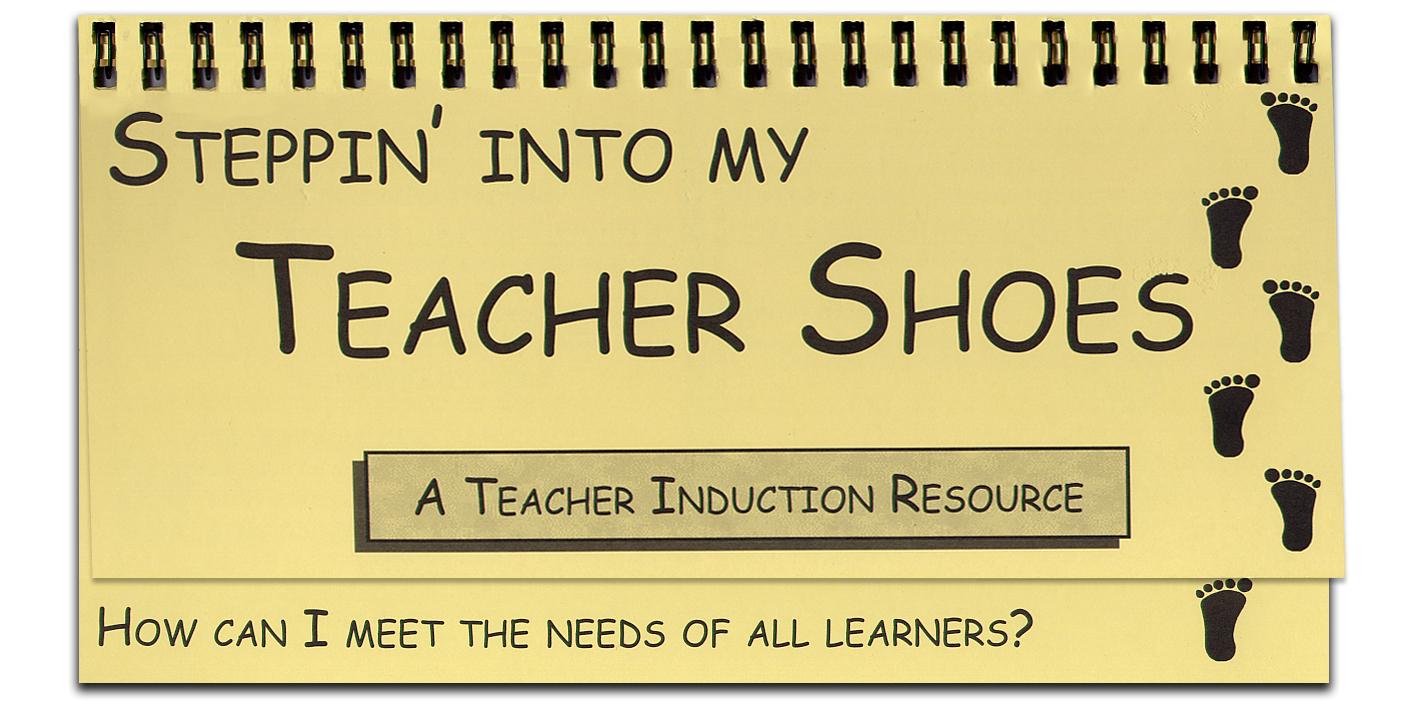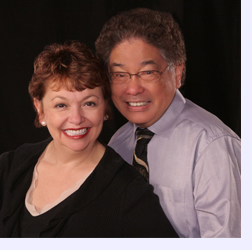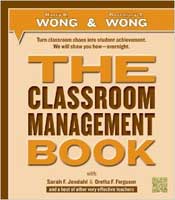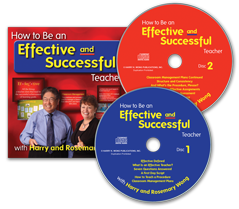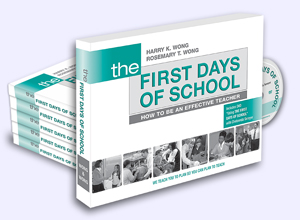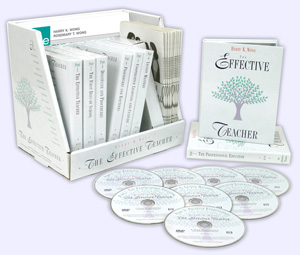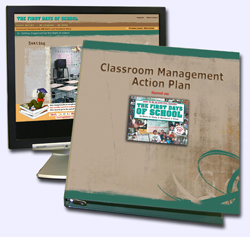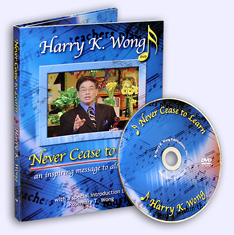|
 |
|
| |||||||||||||||
| by Harry & Rosemary Wong Special to the Gazette September 1, 2009 |
|||||||||||||||
Exceeding All Expectations
For those of us who know her, she is “Ruby,” a third generation migrant worker. Her grandparents immigrated to America from Mexico and worked as migrant laborers. Ruby’s parents knew that education was the key to giving their children the opportunity to be something more than farm workers. They wanted better for their children. Her parents worked the Florida fields during the school year and when the summers came, the entire family worked a bushel at a time to eke out their survival. Because of the erratic attendance of a migrant family, Ruby was pulled from the regular classroom in sixth grade and placed in a class for migrant working families. It was not because she was behind in her studies or received poor grades. School and schoolwork were not a struggle; it was because she was simply the child of a migrant family and the expectation of migrant children to succeed was low. Ruby constantly found herself battling the stereotype others had of her as a migrant. This same labeling still happens in our classrooms today with those who believe that children from certain neighborhoods, inner city children, children of dubious national origin, race, skin color, religious background, income, or even gender, cannot achieve success in school. Ruby felt her school was saying she wasn’t smart enough for regular classes. Worse, being pulled from regular classes meant there was little chance that Ruby would graduate and go on to high school. Ruby’s dad had to go to school and argue with her principal over what we now call the “soft bigotry of low expectations.” Luckily, Ruby had parents who had high expectations for her and since that day she has passionately committed herself to living up to her parents’ high expectations. High School Was No Better Ruby fought her way through the system and made it to high school. Proud and confident, Ruby strode into her high school guidance counselor’s office, full of certainty, with every expectation of going to college and proclaiming her dream of becoming a teacher. But it was not to be. Her counselor enrolled Ruby in a cosmetology course because she was “a migrant.” It was almost enough to break her. Ruby says, “You’re taught all through school, America is the land of opportunity. Dream dreams and you can fulfill them. Aspire to be anyone or anything you want to be. You can even be a justice of the Supreme Court or president of the United States. “Be whatever you want to be, be the best you can. You’re told this over and over, and here I tell this man what I want to do, and he comes back at me with a different career, because I was born ‘a migrant’. He had no idea of my capabilities or my dreams.” Ruby’s Aha Moment College was better because she was now on her own, but the path was not easy and incorrect choices made along the way had her working even harder to realize her promise to her mother, and her dream of becoming a teacher. One day, while working in the university’s media center, Ruby was struck by an awareness she had never felt before. The pieces of the puzzle were beginning to fit and make sense. She saw her potential in the courses she was taking—humanity classes, geography classes—she felt her dream of teaching throughout her body; she heard her calling in her very soul. Working day and night, she finished a degree at the community college and applied for a job and scholarship at the University of South Florida. It was during those years that she got a job as a teaching assistant at a local elementary school, and that did it! She “fell in love with teaching.” After graduating from the University of South Florida, Palmetto Elementary School in Florida gave her the opportunity to start living her dream. First Day of School Contract Ruby’s experiences—of being stereotyped as a migrant, of not being given options, and of not being allowed to make her own choices—have deeply influenced Ruby’s teaching philosophy. She places great emphasis on collaboration between the teacher, the student, and the parents. For Ruby, this partnership is what teaching is about. “When you teach, “The most effective thing I do,” says Ruby, “is to create a contract with my students on the very first day of the school year.” Ruby gets her students excited about spending time in school by saying, “Look at this great big classroom! Look at those awesome books we have in the corner, and those comfy chairs, and this wonderful area where we can all sit, talk, and dream together!” Then, Ruby asks her students, “But there are so many of us—how are we all going to live together in this classroom?” Ruby leads the discussion to help her students recognize the expectations (rules) that must be in place for the class to live and work together. For instance, Ruby asks questions like, “Are we allowed to pinch each other?” The students invariably respond, “Oh no, no! We’re not allowed to pinch each other!” Ruby then adds this expectation to an Expectations Chart posted in class. In this way, Ruby guides her students through her expectations, while encouraging her students’ input. Once Ruby and her students have created an Expectations Chart, Ruby says, “Let’s think about this chart for a bit. Is there anything else we’d like to add to it? Are there things we’d like to change?” Because Ruby’s students had a hand in creating the classroom expectations, they understand that they’re promising to abide by them. Expectations (rules) have consequences if they are not followed, and Ruby explains these consequences to her class. First Time . . . . . . . . . . . . Verbal or Non-verbal warning Once Ruby and her students have discussed the classroom expectations and consequences, Ruby transfers them to individual, formal contracts. Ruby puts a gold seal on every contract, and makes them look very grand and official. Then, the students sign it, the parents sign it, and Ruby signs it. “This contract doesn’t just sit in students’ desks. We always go back to the contract. After spring break, winter break, summer, and every time I think it’s needed, we revisit the contract and have a little ceremony. It is the most effective thing I do,” says Ruby. Click here to see Ruby’s unique way of getting her students to abide by the classroom expectations with her First Day of School Student-Parent-Teacher Contract. Holding a Parent-Teacher-Student Conference Having a contract doesn’t mean Ruby never has to call home. When it comes to holding conferences, Ruby has a few golden rules: “Before I schedule a conference, I always, always ask the child and myself, Ruby believes that when you have a conference with a parent and the child, you need to ensure that the child does not become a third party in the conversation. “Don’t talk over the child, talk to the child. It is vital that you include the child, so that he or she feels a part of the solution. Ultimately, the responsibility of carrying out the solution falls on the child,” says Ruby. Ruby says that her children don’t get defensive if they’ve been part of the conversation from day one. “I entrust my students with the responsibility of suggesting how they can resolve a situation. If they can’t come up with an idea, or if they turn to me and ask for help, then we’ll have a discussion about how I can help support them in fixing the problem.” Ruby remembers one student going on a rampage in her classroom. The student swept her table clean—sent all the books, files, papers, and stationery on it crashing to the floor. Then he started sweeping his classmates’ possessions off their desks as well. Ruby took his hand, looked him in the eye, and said, “I will not allow you to hurt anyone in class. And I will not allow anyone to hurt you. “The child needs to believe you’re an advocate for every child in the room, Daily Class Meetings Communication with her students is important to Ruby. She uses daily class meetings to engage her students in thoughts about what has happened during the day. Topics range from materials learned to discussing an issue that needs to be resolved. Ruby’s students are accustomed to having daily class meetings. During meetings, students also play the “What if?” game. In the “What if?” game, Ruby poses hypothetical situations to her students like: What if somebody steals my pencil? What do I do? Ruby asks her students for suggestions on how to handle the matter. Then, she gradually adds elements to the situation. For instance: But what if it’s a very special pencil from my favorite Aunt? What if it’s such a special pencil that it can’t be replaced? The aim of the “What if?” game is to get students thinking about their responses and reactions to situations—either to issues that the teacher can foresee happening or to issues that the teacher believes kids should know how to deal with. Classroom Procedures for the First Days of School Like all effective teachers, Ruby’s classroom hums with procedures. One of the procedures she has in place for her students in sunny, hot Florida is the Water Bottle Procedure! Water Bottle Procedure Expectation: Students will keep a filled water bottle on their desk at all times. Process:
Teacher Responsibility:
In addition to the Water Bottle Procedure, she teaches these procedures on the first day of school: 1. Preschool Procedure Click here to see the process she uses to teach these procedures. If you would like more information on how to teach a procedure, please read Chapters 19 and 20 in The First Days of School, 4th edition. Daring to Dream Ruby brings to the profession a tenacity to aspire and a stubbornness of not letting anything get in her way. In 1992, she received the Sallie Mae Beginning Teacher of the Year Award. In 1998, Ruby received the Milken Educator Award. One of the criteria for selection is an inspiring presence that motivates and impacts students and colleagues. Ruby dared to chase her dream and now encourages those in her charge to do the same. In 1998, she received the Manatee County District Teacher of the Year Award. She is only one of two in a family of 102 grandchildren to receive a college degree. She is a National Board Certified Teacher and this “migrant” child who was being counseled into a different career received her Ph.D. in Curriculum and Instruction, with an emphasis on Reading in 2009. With her doctorate behind her, “Dr. Ruby” says, “I continue to dream. I envision many things: Setting up a center for the advancement of Hispanic students; helming a non-profit organization to promote literacy; or taking on a principalship and impacting change on the ground. I’ve even considered going to law school. “As a teacher, it seems that many things get passed into law that don’t really connect to what goes on in classrooms. In Florida, for instance, teachers need to have 300 hours of ESOL (English for Speakers of Other Languages) strategy work. Yet, despite this training, we don’t serve our ESOL learners well—there is a lack of accountability in the classroom to these students. “We keep making the same mistakes, and if I understood more about the legal process . . . if the people making the laws had a better idea of what goes on in classrooms, of what we can do to help, and of what’s really at our disposal, then we can work towards the whole system being more accountable—rather than just going through the motions and not really affecting anything.” Collaboration in Marriage While Ruby was relentlessly slaying the world, she married a fellow teacher, Steve Zickafoose, and collaborated with him to raise three beautiful children. Together, they developed an impressive guide for new teachers entitled Steppin’ into my Teacher Shoes. The guide answers these questions:
Contact Ruby and Steve at ByondZ@aol.com for more information on Steppin’ into my Teacher Shoes.
To Know Ruby We met Ruby in the late 1980s at a speaking engagement in her school district. Ruby’s young son introduced Harry at the meeting. We talked with Ruby and heard from others in the district about her amazing accomplishments in spite of her upbringing. We knew right away that Ruby was destined to be the difference for her students. Ruby was profiled by legendary news anchor Dan Rather in his 2001 book, The American Dream: Stories from the Heart of Our Nation. It is from Rather’s book that we learned the full details of Ruby’s incredible journey—from a childhood spent laboring in the fields, to becoming the formidable educator she is today—and share them with you in this column. The rest of the story is riveting and we encourage you to get your hands on a copy of the book. Through the years, we have kept in touch with Ruby. We’ve watched her family grow, her husband excel in education, and her passion for children burn brighter. To know Ruby is to know that once her mind is set on something, she will not give up until she achieves it. If all teachers had Ruby’s determination, the hopes and dreams of children would soar. One of the three characteristics of an effective teacher is having positive expectations for student success and achievement. At this time of the year, students trudge from room to room, hoping their teacher this year will inspire and push them to go beyond, to exceed everyone’s expectations—including their own. Be the dream maker, the positive force for your students this year. Believe that they can succeed—no matter where they come from, and regardless of any other factors. A child in a classroom is a painting waiting to come to life, to awe all those who take notice. Craft the colors of a beautiful world full of potential for each of your students. Believe in them and their endless possibilities. And yes, little eight-year-old Rubylinda made good on her promise.
|
|||||||||||||||
|

 Her parents and brothers worked the fields, and at age eight, Ruby joined them under the scorching summer sun. Ruby’s young life was spent following the harvest road and sharing shelter, food, and, if lucky, running water.
Her parents and brothers worked the fields, and at age eight, Ruby joined them under the scorching summer sun. Ruby’s young life was spent following the harvest road and sharing shelter, food, and, if lucky, running water.